
Content of this journal is licensed under a Creative Commons Attribution-NonCommercial 4.0 International License.
Inaccurate knowledge, attitudes, and beliefs of youth about sexuality during pregnancy
Elif Dağlı1, Feyza Aktaş Reyhan21Cukurova University, Abdi Sütcü Vocational School of Health Services, Department of Health Care Services, Adana2Kütahya University of Health Sciences, Faculty of Health Sciences, Midwifery Department, Kütahya
OBJECTIVE: Myths about sex are defined as unscientific, false, and exaggerated beliefs about sexual matters. Sexuality myths are especially prevalent among young people. For this reason, it is important to reveal young people’s attitudes towards and knowledge about sexuality myths. This study was conducted to determine young individuals’ inaccurate knowledge, attitudes, and beliefs about sex life during pregnancy.
MATRERIAL and METHODS: This descriptive study was conducted at the higher school of a public university. The population of the study consisted of 2485 students, and the sample included 493 students. The study data were collected via a personal information form and the Sexual Myths during Pregnancy Scale. Frequency tables and descriptive statistics were used to interpret the findings. Consistent with nonparametric methods, Mann-Whitney U, Kruskal-Wallis H tests, and Bonferroni correction statistics were employed.
RESULTS: The mean age of the students was 21.19±1.86 (years), and 56.4% were female. It was determined that 59.8% of the students had difficulty sharing sexuality issues, 92.7% did not talk about sexuality in their families, 80.9% had not received sexual health education, and that 97.2% had not received sexual health education during pregnancy. A statistically significant difference was found in terms of the scores on the pregnancy and sexuality, anxiety about the baby, sex/attraction, and anxiety about pregnancy sub-dimensions and total scores on the scale of sexual myths according to the status of having received sexual health education (Z=-8.820, p=0.000; Z=-9.494, p=0.000; Z=-10.902, p=0.000; Z=-11.684; p=0.000; Z=-12.950; p=0.000, respectively).
CONCLUSION: It was determined that the majority of the young people in the study had not received sexual health education and that these young people had more inaccurate knowledge, attitudes, and beliefs about sexuality during pregnancy.
Keywords: youth, sexual myths, pregnancy, sexuality during pregnancy
Gençlerin gebelikte cinselliğe ilişkin yanlış bilgi, tutum ve inançları
Elif Dağlı1, Feyza Aktaş Reyhan21Çukurova Üniversitesi Abdi Sütcü Sağlık Hizmetleri Meslek Yüksekokulu Sağlık Bakım Hizmetleri Bölümü, Adana, Türkiye2Kütahya Sağlık Bilimleri Üniversitesi Sağlık Bilimleri Fakültesi Ebelik Bölümü, Kütahya, Türkiye
AMAÇ: Cinsel mitler, cinsellikle ilgili konularda bilimsel olmayan, yanlış ve abartılı inançlar olarak tanımlanmaktadır. Cinsel mitler özellikle gençler arasında yaygındır. Bu sebeple gençlerin cinsel mitlere karşı tutumlarını ve bilgi düzeylerini ortaya koymak önemlidir. Bu çalışma ile genç bireylerin gebelik süresince cinsel yaşama ilişkin yanlış bilgi, tutum ve inançlarını belirlemek amaçlandı.
GEREÇ ve YÖNTEMLER: Tanımlayıcı tipte olan bu araştırma, bir devlet üniversitesinin yüksekokulunda yürütüldü. Araştırmanın evrenini 2485 öğrenci, örneklemini ise 493 öğrenci oluşturdu. Araştırmanın verileri kişisel bilgi formu ve Gebelikte Cinsel Mitler Ölçeği ile toplandı. Bulguların yorumlanmasında frekans tabloları ve tanımlayıcı istatistikler kullanıldı. Parametrik olmayan yöntemlere uygun şekilde, Mann-Whitney U, Kruskal-Wallis H testleri ve Bonferroni düzeltmesi istatistikleri uygulandı.
BULGULAR: Öğrencilerin yaş ortalamasının 21,19±1,86 (yıl) ve %56,4’ünün kadın olduğu belirlendi. Öğrencilerin %59,8’inin cinsellik konularını paylaşmakta sıkıntı yaşadığı ve %92,7’sinin ailesinde cinselliğin konuşulmadığı belirlendi. %80,9’unun cinsel sağlık eğitimi almadığı, %97,2’sinin gebelikte cinsel sağlık eğitimi almadığı belirlendi. Cinsel sağlık eğitimi alma durumuna göre gebelik ve cinsellik, bebeğe ilişkin endişe, cinsiyet/cazibe, gebeliğe ilişkin endişe alt boyut ve cinsel mitler ölçeği toplam puanları açısından istatistiksel olarak anlamlı farklılık tespit edildi (sırasıyla: Z=-8,820, p=0,000; Z=-9,494, p=0,000; Z=-10,902, p=0,000; Z=-11,684; p=0,000, Z=-12,950; p=0,000).
SONUÇ: Gençlerin çoğunluğunun cinsel eğitim almadıkları ve cinsel sağlık eğitimi almayan gençlerin gebelikte cinselliğe dair yanlış bilgi, tutum ve inançlarının daha fazla olduğu tespit edildi.
Anahtar Kelimeler: gençler, cinsel mitler, gebelik, gebelikte cinsellik
Manuscript Language: Turkish
(1023 downloaded)













